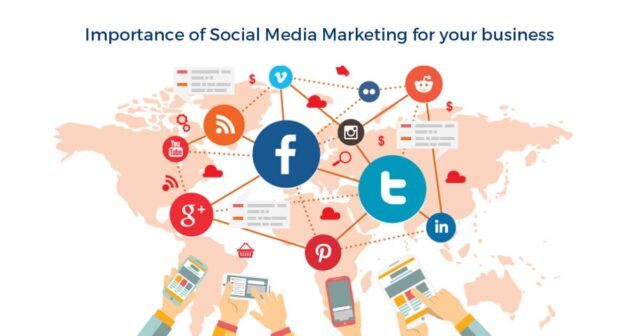In today’s digital landscape, social media has transformed from a platform for personal connections to a powerful tool for business growth and brand development. Companies of all sizes are leveraging social media to connect with their audiences, drive engagement, and ultimately increase sales. In this blog, we’ll explore the key benefits of using social media for business and how it can contribute to your overall marketing strategy.

1. Increased Brand Awareness
Social media platforms provide businesses with the opportunity to reach a vast audience. Here’s how social media can enhance brand awareness:
- Global Reach: With billions of active users on platforms like Facebook, Instagram, Twitter, and LinkedIn, businesses can connect with potential customers from all over the world.
- Consistent Presence: Regularly posting content helps businesses maintain a visible presence in the crowded digital landscape. This consistency builds familiarity and trust with your audience.
- Shareability: Engaging content is easily shareable, allowing users to spread the word about your brand. This organic sharing can exponentially increase your reach and visibility.
2. Enhanced Customer Engagement
Social media fosters direct communication between businesses and their customers. This engagement is crucial for building relationships and brand loyalty:
- Real-Time Interaction: Social media allows businesses to interact with customers in real time. Responding to comments, messages, and reviews promptly can create a positive customer experience.
- Community Building: Creating a community around your brand encourages customers to engage with your content and each other. This sense of belonging can lead to higher customer loyalty.
- Feedback and Insights: Social media platforms provide valuable insights into customer opinions and preferences. Monitoring conversations about your brand can help you understand what resonates with your audience.
3. Cost-Effective Marketing
Social media offers a cost-effective way to promote your business and reach your target audience:
- Affordable Advertising: Compared to traditional advertising methods, social media ads can be significantly cheaper and more targeted. You can set budgets that suit your business and only pay for results, such as clicks or impressions.
- Organic Reach: With engaging content, businesses can achieve organic reach without spending money on ads. Quality posts can attract likes, shares, and comments, increasing visibility without additional costs.
- User-Generated Content: Encouraging customers to share their experiences with your products or services can serve as powerful, free marketing. User-generated content builds credibility and can be shared across your platforms.
4. Improved Search Engine Rankings
Having an active social media presence can positively impact your search engine rankings:
- Increased Online Visibility: Search engines consider social media signals when determining search rankings. A strong social media presence can lead to higher visibility in search engine results.
- Link Building Opportunities: Sharing content on social media can generate backlinks to your website, further enhancing your SEO efforts. When your content is shared, it can attract links from other websites, improving your authority.
5. Targeted Advertising
Social media platforms offer advanced targeting options that allow businesses to reach their ideal audience:
- Demographic Targeting: Businesses can target ads based on age, gender, location, interests, and more. This precision ensures that your message reaches the right people.
- Retargeting Opportunities: Retargeting ads allow businesses to reach users who have previously interacted with their website or social media. This helps keep your brand top-of-mind and encourages conversions.
- A/B Testing: Social media advertising allows for easy A/B testing of different ad formats, messages, and visuals. This experimentation helps businesses optimize their campaigns for better performance.
6. Access to Analytics and Insights
Social media platforms provide valuable analytics that can inform your marketing strategy:
- Performance Metrics: Businesses can track engagement, reach, impressions, and conversion rates to evaluate the effectiveness of their social media efforts.
- Audience Insights: Analytics tools reveal demographic information about your followers, helping you tailor your content to better meet their preferences and needs.
- Content Performance: Understanding which types of content resonate most with your audience can guide future content creation, allowing you to focus on what works.
7. Competitive Advantage
Being active on social media can provide a competitive edge in your industry:
- Stay Ahead of Trends: Social media allows businesses to monitor industry trends and competitor activities in real-time. This awareness enables you to adapt your strategy and stay relevant.
- Showcase Your Unique Brand Personality: Social media gives businesses a platform to showcase their brand voice and personality. By differentiating yourself from competitors, you can attract a loyal customer base.
- Engagement Opportunities: Engaging with customers and addressing their concerns on social media can foster loyalty and give you an edge over competitors who may not prioritize customer interaction.
Conclusion
Incorporating social media into your business strategy offers numerous benefits, from increased brand awareness and customer engagement to cost-effective marketing and valuable insights. As social media continues to evolve, it remains a vital tool for businesses seeking to thrive in the digital age.


No responses yet